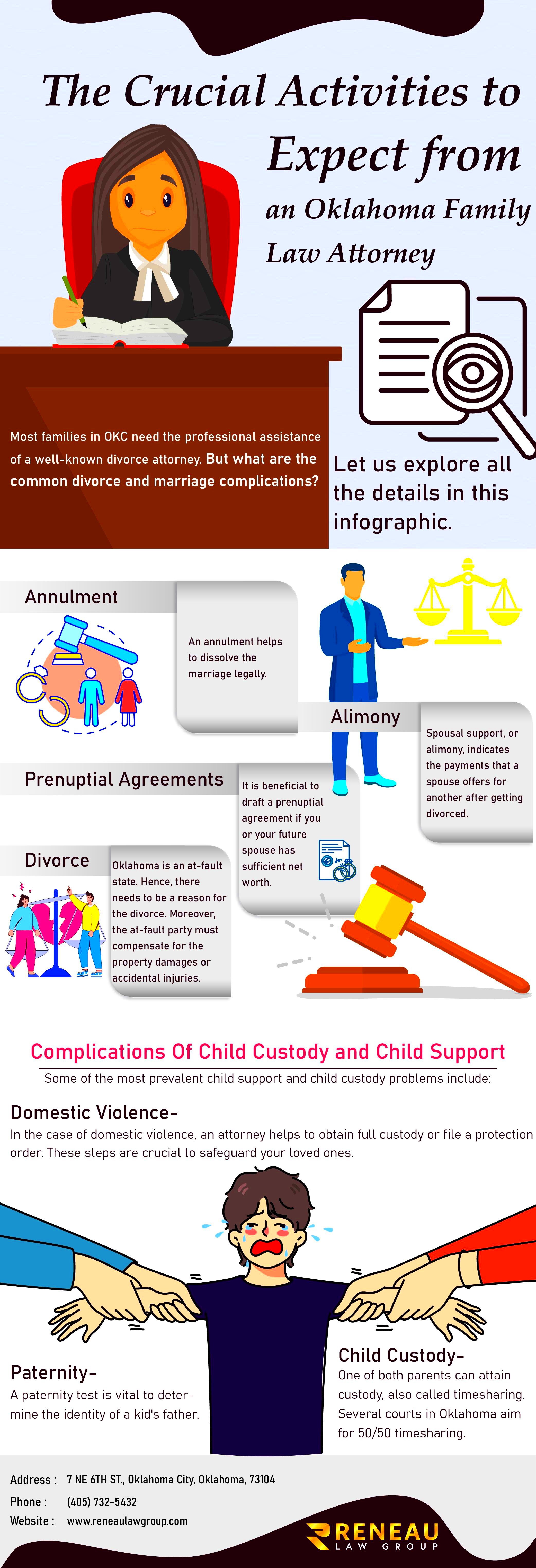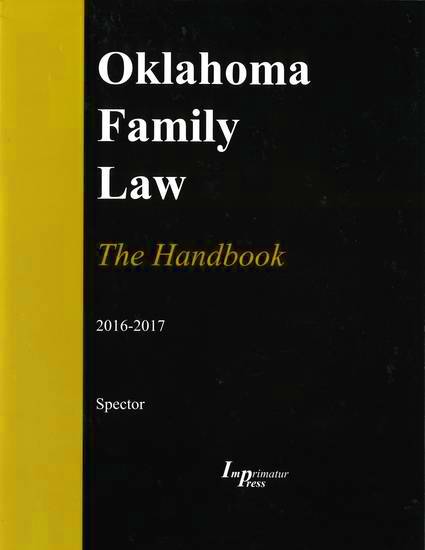Key Aspects of Oklahoma Family Law
Family law in Oklahoma covers a variety of matters, including divorce and child custody each with its own rules and processes. It can be tough to navigate these waters, especially when emotions are running high. This branch of law aims to offer solutions and safeguard the rights of everyone involved. Whether you’re going through a divorce, handling child support or pursuing custody knowing the fundamentals can greatly impact how you approach the situation. Let’s explore the key elements of family law in Oklahoma to give you a clearer idea of what to anticipate.
Overview of Divorce Laws in Oklahoma

In Oklahoma divorce is governed by laws that cover different aspects of ending a marriage. Here’s a brief overview of the key points you should be aware of.
- No-Fault Divorce: Oklahoma allows for no-fault divorce, meaning you don’t have to prove that one party is at fault for the marriage ending. You simply need to state that the marriage is irretrievably broken.
- Residency Requirements: At least one spouse must have been a resident of Oklahoma for six months before filing for divorce.
- Division of Property: The state follows the principle of equitable distribution, which means property is divided fairly, though not necessarily equally. Factors like the length of the marriage and each spouse’s financial situation are considered.
- Waiting Period: There is a 90-day waiting period from the filing date before the divorce can be finalized, allowing time for reconciliation or negotiation.
Navigating a divorce can be challenging but getting a grasp of these fundamentals can assist you in gearing up for the journey ahead. Keep in mind that every situation is different and enlisting an experienced lawyer can offer you guidance that is customized to your circumstances.
Child Custody and Support Guidelines
When dealing with custody and support matters in Oklahoma the primary concern is what benefits the child the most. Here are some key points to keep in mind.
- Types of Custody: Custody can be either physical or legal. Physical custody refers to where the child lives, while legal custody involves making decisions about the child’s education, health, and general welfare.
- Best Interests of the Child: Courts prioritize the child’s best interests when making custody decisions. Factors include the child’s relationship with each parent, their adjustment to home and school, and each parent’s ability to provide for the child’s needs.
- Child Support: Oklahoma uses guidelines to determine child support amounts. The court considers factors such as each parent’s income, the number of children, and any special needs the child may have. The aim is to ensure the child’s standard of living is maintained.
- Modification of Orders: Custody and support arrangements can be modified if there are significant changes in circumstances, such as a parent’s job loss or relocation.
Navigating matters surrounding custody and support can be a journey. Its important to prioritize the child’s welfare in every decision made. Seeking advice from a lawyer can safeguard your rights while keeping the best interests of your child in mind.
Division of Property and Assets
Splitting up belongings and resources when getting divorced can be quite a challenge. In Oklahoma the goal is to make the process fair but grasping how it functions can help alleviate some of the pressure. Lets take a moment to delve into it more deeply.
- Equitable Distribution: Oklahoma follows the principle of equitable distribution, which means property is divided fairly but not necessarily equally. The court considers various factors, including the length of the marriage and each spouse’s economic situation.
- Marital vs. Separate Property: Marital property includes assets and debts acquired during the marriage, while separate property belongs to one spouse and is not subject to division. However, commingled assets can sometimes complicate this distinction.
- Debts and Liabilities: Just as with assets, debts incurred during the marriage are generally divided equitably. This can include mortgages, credit card debt, and other financial obligations.
- Valuation and Division: Accurate valuation of property is crucial. Often, professionals like appraisers or financial experts are called upon to determine the value of real estate, businesses, and other significant assets.
Through my personal journey of dividing assets amidst a family conflict, I realized how crucial it is to be transparent and just. Having records and fostering communication can make the process smoother and prevent lengthy disagreements. Collaborating with an attorney can offer valuable support and ensure that your needs are effectively represented.
Spousal Support and Alimony
Alimony, also known as support plays a role in divorce cases to ensure that both individuals can uphold a reasonable quality of life. Lets delve into the key points you need to be aware of.
- Types of Alimony: There are different types of alimony in Oklahoma, including temporary, rehabilitative, and permanent. Temporary alimony is provided during the divorce process, rehabilitative helps one spouse get back on their feet, and permanent is awarded based on long-term need.
- Factors Affecting Alimony: The court considers various factors, such as the length of the marriage, the financial needs and resources of each spouse, and each spouse’s earning capacity. Contributions to the marriage, including homemaking, are also taken into account.
- Modification and Termination: Alimony can be modified if there is a significant change in circumstances, such as a change in the recipient’s financial situation or a new marriage. It generally ends if the recipient remarries or if the payer faces substantial hardship.
Based on what I’ve noticed spousal support can occasionally create some friction. The goal is to make sure that neither person ends up facing unnecessary difficulties. Honest communication and fair discussions play a role in achieving a well balanced and equitable outcome. Seeking advice from an attorney can provide guidance on this divorce matter in a clear and fair manner.
Legal Processes for Adoption
Adopting a child is a fulfilling journey, but it comes with legal procedures to ensure everything is done correctly. Here’s a breakdown of the adoption process in Oklahoma;
- Eligibility: Prospective adoptive parents must meet certain requirements, such as age, residency, and background checks. The state wants to ensure that children are placed in safe, loving homes.
- Types of Adoption: There are various types of adoption, including domestic, international, and foster care adoptions. Each type has its own set of procedures and requirements.
- Home Study: A home study is required to assess the suitability of the adoptive home. This includes interviews, home visits, and background checks to ensure the environment is stable and supportive.
- Legal Finalization: Once an adoption is approved, the final legal process involves a court hearing where a judge reviews the case and issues an adoption decree, making the adoption official.
Having observed the journey of adoption through the experiences of friends and relatives I have witnessed the happiness and satisfaction it brings to families. Although the process may be time consuming and require careful examination its purpose is to ensure that every child is placed in a nurturing and secure environment. With support navigating this process can make the path more seamless and clear allowing you to concentrate on embracing an addition to your family.
Domestic Violence Protections and Procedures
Domestic violence is a serious issue and Oklahoma has steps in place to protect those who require assistance. The justice system strives to ensure the safety of victims offer support and hold offenders responsible. Lets explore how the state tackles this important matter.
- Protection Orders: Victims of domestic violence can seek a protection order (also known as a restraining order) from the court. This legal document can prohibit the abuser from contacting or coming near the victim and their children.
- Types of Orders: There are different types of protection orders, including emergency, ex parte (temporary), and final orders. Emergency orders provide immediate protection, while final orders are issued after a court hearing where both parties can present their case.
- Legal Assistance: Victims can receive assistance from legal aid organizations and domestic violence shelters. These resources can help navigate the legal system, provide counseling, and offer safety planning.
- Enforcement: Violating a protection order is a criminal offense. Law enforcement can arrest the abuser if they breach the terms of the order, providing an additional layer of safety for the victim.
Based on what I’ve witnessed firsthand I understand the importance of these safeguards in protecting individuals impacted by domestic violence. Although the legal proceedings can be intricate they aim to prioritize the victims welfare. If you or someone you care about is dealing with domestic violence reaching out to community resources and legal experts for assistance can greatly help in obtaining protection and support.
Modification and Enforcement of Family Law Orders
When family law orders are established there might be instances where changes are needed to accommodate evolving situations. The legal framework in Oklahoma offers pathways to modify and uphold these orders to ensure they stay relevant and just. Here’s a brief summary:
- Modification of Orders: Changes in circumstances, such as a job loss, relocation, or changes in a child’s needs, may warrant modifications to existing orders. To request a modification, one must file a petition with the court, providing evidence of the significant change.
- Enforcement: If one party does not comply with a court order, enforcement actions can be taken. This might include wage garnishment for unpaid child support or other legal measures to ensure compliance.
- Legal Assistance: Navigating modifications and enforcement can be challenging. Legal professionals can offer guidance on the process, ensuring that requests are properly filed and that rights are protected.
Having encountered challenges in the past I recognize how crucial it is to be adaptable and uphold family law. Life evolves and so should the legal frameworks that shape family relationships. Smoothly navigating these transitions relies on communication and robust legal assistance to ensure that family law orders remain relevant and effective in fulfilling their intended role.
Frequently Asked Questions
Dealing with family law issues can bring up a lot of uncertainties. Here are a few frequently asked questions that might shed light on common worries.
- What is the difference between legal and physical custody? Legal custody involves making decisions about a child’s welfare, while physical custody refers to where the child lives.
- How is child support calculated? In Oklahoma, child support is calculated based on guidelines that consider the income of both parents, the needs of the child, and other relevant factors.
- Can a protection order be modified or extended? Yes, a protection order can be modified or extended if there are ongoing safety concerns or changes in circumstances.
- What should I do if I can’t afford a lawyer? Legal aid organizations and pro bono services may offer assistance. It’s important to seek help to ensure your legal rights are protected.
When it comes to family law matters people often have a lot of questions and concerns. Every situation is different and getting advice from a lawyer can offer personalized guidance and assistance. Knowing your choices and rights can help you make decisions and navigate the challenges of family law more confidently.
Conclusion
Navigating the complexities of family law in Oklahoma is essential for addressing challenges that come up in both personal and legal matters. Whether it’s divorce, child custody, property division or adoption each area has its own set of rules and factors to consider. Based on my observations and experiences I’ve realized how important it is to approach these situations with transparency, compassion and well informed advice. Whether you’re facing a custody dispute or seeking protection against domestic violence understanding these legal principles can have an impact. Always keep in mind that seeking tailored professional guidance for your circumstances can offer support and ensure that your rights and interests are effectively upheld. Family law goes beyond procedures; it focuses on achieving outcomes and safeguarding the well being of everyone involved.


